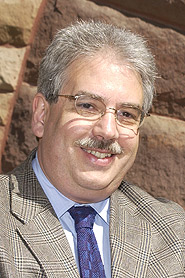Berkeleyan
Obituary
Nichoas Howe
![]()
18 October 2006
Nicholas Howe, professor of English and a leading scholar of Anglo-Saxon England, died of complications from leukemia on Sept. 27 at Kaiser Permanente Medical Center in Oakland. He was 53.
 Nicholas Howe |
Howe's works include The Old English Catalogue Poems: A Study in Poetic Form and the influential Migration and Mythmaking in Anglo-Saxon England, the latter of which opened up new ways of looking at Old English literature and culture. A new book, Writing the Map of Anglo-Saxon England: Essays in Cultural Geography - the focus of his work during a year's Guggenheim Fellowship in 2002-03 - will be published by Yale University Press in 2007.
Howe earned his B.A. in English at York University in Toronto in 1974 and his Ph.D. in English from Yale in 1978. He was appointed assistant professor in Rutgers University's English department in 1978, then left to become an associate professor at the University of Oklahoma in 1985. In 1991 he was appointed full professor at Ohio State, where he became director of the Center for Medieval and Renaissance Studies, which he built into a nationally recognized program. He joined the Berkeley faculty in 2003.
He was named a Fellow of the Medieval Academy of America, the organization's top honor, in 2005.
Central to Howe's scholarship, said Roberta Frank, a Yale University professor of English, was a fascination with language, landscape, and North American culture. Howe's most recently published book, Across an Inland Sea: Writing in Place From Buffalo to Berlin, blended personal memoir with travel writing and was illustrated by his own photographs. "He wrote movingly and memorably," said Frank, "not only on medieval literature but on hyenas and unipeds, on metaphor in American political discourse, on construction cranes, on Italo Calvino, C.P. Cavafy, and Joan Didion, on fast-food America, on the desert landscape of Oklahoma, and on the academic profession, all in graceful, fluent prose."
Kevis Goodman, a Berkeley colleague of Howe's, called Across an Inland Sea a "haunting study of writing in and about places" in his life. She said it blended literary commentary with regional lore and his own photography in chapters on cultural capitals like Paris and Berlin, as well as on Oklahoma and Columbus, Ohio. "Such combinations, among others, testify to the versatility of his writing and thinking, his marvelous ease with both the erudite and the everyday," said Goodman.
"His colleagues feel his loss keenly," said Anne Middleton, another Berkeley colleague. "His intuitive wisdom about the larger institutional enterprise has made him a trusted and treasured colleague, mentor, friend, research interlocutor, and partner in learning. The campus will be a smaller and poorer place without him."
Family members and colleagues noted that Howe's love of life - good food, good wine, good books, entertaining, travel, and good friends - was contagious, and they admired his honesty, courage, and thoughtfulness.
Survivors include his widow, Georgina Kleege of Berkeley, and sister, Nina Howe of Montreal.
A memorial service will be held on campus at a date to be determined.
Kleege requests that donations in Howe's memory be made to the Leukemia Research Foundation (www.leukemia- research.org), Recordings for the Blind and Dyslexic in Princeton, N.J. (www.rfbd.org), or The Dictionary of Old English at the University of Toronto (www.doe.utoronto.ca).
- Kathleen Maclay

